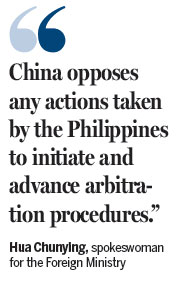Beijing rejects arbitration gambit
Updated: 2015-07-08 07:52
By Zhang Yunbi(China Daily)
|
|||||||||||
China criticized the Philippines on Tuesday for "betraying bilateral consensus" on resolving its South China Sea concerns through negotiations, as an international tribunal at The Hague took up Manila's request for arbitration over the issue.

The five-member tribunal is to "address China's contention that the arbitration body does not have authority to assume jurisdiction over Manila's complaint against Beijing", The Associated Press reported.
The Philippines initiated the arbitration case in January 2013.
Foreign Ministry spokeswoman Hua Chunying said on Tuesday that China has repeatedly stated its position that it will not participate in any hearing and will not accept any result.
Manila's decision to initiate arbitration has violated its promises regarding the Declaration on the Conduct of Parties in the South China Sea, Hua said at a news conference in Beijing on Tuesday.
"China opposes any actions taken by the Philippines to initiate and advance arbitration procedures," Hua added.
Li Jinming, a professor of South China Sea studies at Xiamen University, said the Philippines' request for international arbitration is intended to "tarnish China's image, making it out to be a villain".
"Manila is eager for an early completion of arbitration" because the Philippine leadership will be reshuffled in 2016, Li said.
Any ruling, favorable or not to the Philippines, will make no difference to the situation as China has already rejected the arbitration and refused to attend, Li said.
"They (the Philippines) attempt to shape and make use of world opinion to justify their illegal occupation of Chinese islands" in the South China Sea, Li said.
Hua noted that in December, the Foreign Ministry was authorized to release a position paper on the South China Sea arbitration initiated by the Philippines that found the tribunal has no jurisdiction at all.
"Based on the foregoing positions and by virtue of the freedom of every state to choose the means of dispute settlement, China's rejection of and nonparticipation in the present arbitration stands on solid ground in international law," it said.
Wu Shicun, president of the National Institute for South China Sea Studies, said Manila was "sugarcoating its lawsuit" by stating that the matters before tribunal have nothing to do with the territorial sovereignty of the islands.
Tensions have overshadowed the Philippines' relationship with China recently as the Manila government released a three-episode documentary criticized by some observers as "instigating hostility among ethnic groups inside the country and inflaming hatred against China outside the country".
Foreign Minister Wang Yi spoke about the Chinese islands in the South China Sea last month and noted that the international community had never raised doubts about China's sovereignty over the Nansha Islands until the 1960s.
Ruan Zongze, vice-president of the China Institute of International Studies, said the Philippines had elaborately prepared for its first tribunal on the issue, and signs pointed toward a US stake in the case.
Related Stories
South China Sea arbitration tribunal has no jurisdiction over Manila-started dispute 2015-07-08 07:54
China urges Japan not to obstruct peace on South China Sea 2015-07-06 19:14
China urges Japan to stop provoking tensions in South China Sea 2015-07-03 23:49
Meddling in South China Sea won't help resolve maritime dispute 2015-07-02 07:53
China urges US to take objective view of South China Sea 2015-06-29 19:44
China says South China Sea not an issue with US 2015-06-23 17:53
Today's Top News
Xi stresses peace on visit of war exhibition
China, EU to promote digital Silk Road: Internet regulator
Envoy cites benefits of strong ties
China predicts Greece to
stay in eurozone
China able to deal with risks to economy: premier
Govt prefers peaceful means in resolving row
Geely to invest big in methanol fuel
Country's cold remedy enters the UK market
Hot Topics
Lunar probe , China growth forecasts, Emission rules get tougher, China seen through 'colored lens', International board,
Editor's Picks

|

|

|

|

|

|






